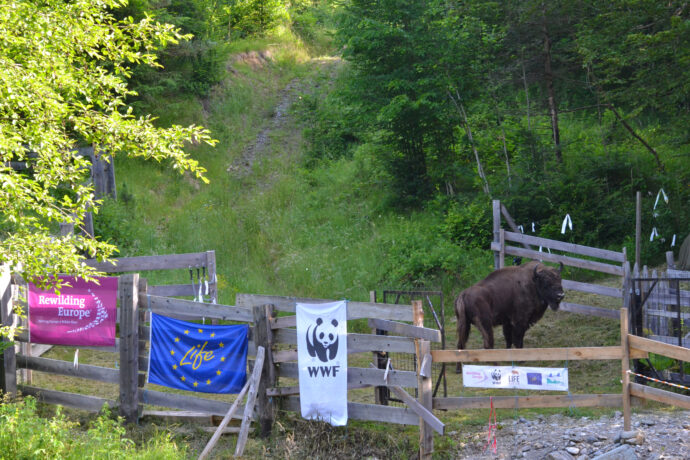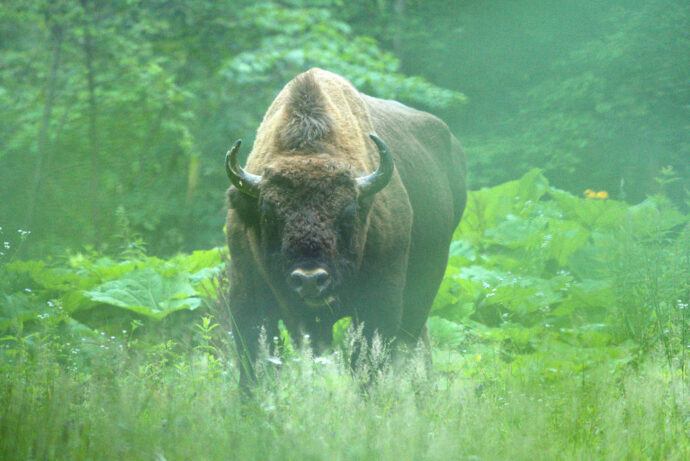Unique European bison transport just arrived in the Southern Carpathians, Romania
The first relocation of its kind in Europe, with only male European bison, took place yesterday, June, 30th in the place known as the Bison Hillock, in the Southern Carpathians rewilding area of Romania. The 7 individuals arrived from Germany through the LIFE RE-Bison project and will contribute to the genetic diversity of the free-ranging population of bison.

The transport was prepared at length by WWF-Romania, Rewilding Europe and the German Donaumoos, Bad Berleburg, Neumünster and Bielefeld Reserves where the bison came from. The decision to relocate the males was taken after a complex selection process and consultations with the IUCN SSC Bison Specialist Group on the ethology and conservation of the species.
The bison spent six months together in the Donaumoos Wisentgehege reserve to get to know each other and to facilitate the adaptation process once they arrived in the unknown environment of the Natura 2000 Țarcu Mountains Site.
“After 6 years we can say that we have had many firsts in this project, from having more than 25 calves born in the wild, to GPS data that shows a bison reaching an altitude of more than 2000 meters in the Țarcu Mountains, and now we managed to successfully deliver a unique transport, consisting only of males. This is a pioneering project, and this helps the whole scientific community in Europe to better understand the species and to have good results in its conservation”, says Marina Drugă, LIFE RE-Bison Project Manager, WWF Romania.
After the quarantine period, the newly-arrived males will be released into the wild where, thanks to the last two relocations from this year, there is now a population of 100 bison, the largest in Romania.
These males are still young, but at maturity they can weigh more than 800 kg, while females can reach over 600 kg. Male bison are solitary and spend most of their time away from the female group with calves, but return during the breeding season and over winter.

Photo: Daniel Mîrlea / Rewilding Europe
“When monitoring males like Bilbo, brought from Sweden in 2017, you can’t help but treat it with respect, like a wild animal should be treated. We have no way of weighing him, but this male looks like he’s at least 900 kg. The landscape suits him well, he’s all muscle as he travels dozens of kilometers through forests, hills and pastures and has plenty of food,” says Daniel Hurduzeu, ranger in the Bison Hillock.
The reintroduction of the bison in the Southern Carpathians is part of the project ” Urgent actions for the recovery of European Bison populations in Romania”, implemented by WWF Romania and Rewilding Europe, with financial support from the European Union, through the LIFE Programme and together with local communities.
About the LIFE RE-Bison project
Once widespread throughout Europe, the European bison was driven to extinction at the beginning of the 20th century by over-hunting and habitat loss. As of 2014, the ongoing Rewilding Europe and WWF-Romania programme for the reintroduction of the bison is the largest attempt of its kind in Romania.
The first two transports took place in 2014 and 2015 in the Tarcu Mountains, in the vicinity of Armeniș commune. The transports were then repeated every year since 2016 as part of the LIFE Re-Bison project co-funded by the European Commission. We now have the largest free-ranging population of over 100 individuals. The overall objective of the LIFE Bison project is to establish a demographically and genetically viable wild population of bison in the Southern Carpathians. Future sub-populations in other areas will be connected by natural corridors, allowing migration and genetic exchange.
Close collaboration
WWF Romania and Rewilding Europe are working closely with the local communities, involving local entrepreneurs, ROMSILVA, forestry offices, hunting associations and tour operators, ensuring that the reinintroduction programme will achieve all its objectives.
For further information please contact:
Marina Drugă, LIFE-Bison Project Manager, WWF-Romania, mdruga@wwf.ro +40 729.097.969
Bianca Ștefănuț, Communication Officer WWF-Romania, bstefanut@wwf.ro, +40 730.098.722
Want to know more?
- Bison rewilding in the Southern Carpathians
- Track reintroduced bison in the Southern Carpathians with the European Safari Company
Blog entries express the views and opinions of their authors, which might not always fully overlap with those of Rewilding Europe.